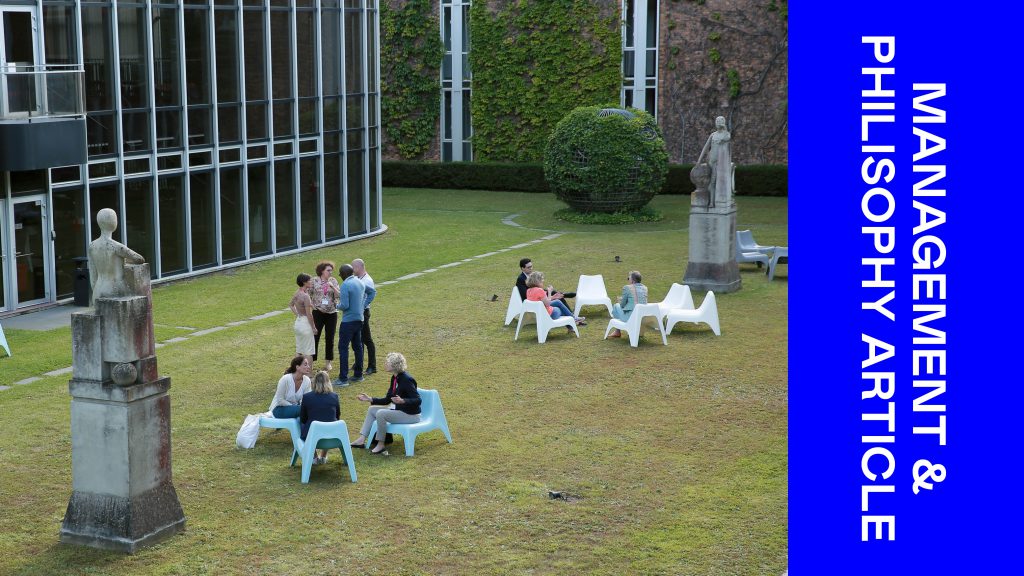As the world’s digital and economic transformation accelerates in the midst of a global pandemic bringing with it large-scale behavior changes and uncertainties, insights from philosophy can help leaders search for meaning and evolve in the new and unknown.
Learn more about this topic in our November 2020 article in Philosophie magazine
For more information about our Management and Philosophy programme, contact Muriel Pailleux at muriel.pailleux@cedep.fr and click here for the programme description.
November 2020
HOW CAN PHILOSOPHY BUILD RESPONSIBLE, VISIONARY LEADERS
As the world’s digital and economic transformation accelerates in the midst of a global pandemic bringing with it large-scale behavior changes and uncertainties, insights from philosophy can help leaders search for meaning and evolve in the new and unknown.
The COVID-19 pandemic has forced us to question our assumptions, such as the remote work environment that has allowed businesses to continue operations. This disruption to the office work environment will generate new behaviors and relationships to work in the long term as individuals realize their beliefs about remote work have changed. Even before the global pandemic, the changing economic, social and environmental situation, were entering a make-or-break decade for humanity to act. The role of leaders must evolve to accompany this shift in society. But how can leaders develop responsible thinking and navigate in the unknown?
Philosophy is about questioning assumptions, observing and analyzing how you make decisions, and asking great questions, which is more difficult than coming up with the answers. For example, in business we typically assume the questions are easy and obvious and the answers are difficult. This inversion is interesting when we become philosophical because the “ability to ask great questions” doesn’t show up as an issue for managers and many don’t think of it as an issue at all. However, asking the right questions effectively is a major component of any manager’s job, and asking great questions often distinguishes exceptional leaders from average ones. Many managers and leaders don’t know how to examine the thought process of their colleagues and instead make assumptions about the basis of their actions.
Business is under the belief that management is a science driven by rigorous analysis of data. And that data should be at the center of all decision-making. But what if business decisions are not driven by numbers but of ideas? Could we be mistaken in our decisions if we rely on our ideas? If we make decisions by numbers and assume we are right; but make decisions by our ideas and assume we are wrong, we bring a skeptical attitude to our own beliefs. This skeptical attitude enables us to consider different perspectives and opens our mindset to make better, informed decisions.
Learning to use philosophical analysis to break the current limits of contemporary management takes training to expand the thought process.
A philosophy approach helps leaders:
- Think about problems from a deeper point of view, which can uncover potential blind spots or new things to consider
- Use critical thinking skills to ask the right questions, listen with an open-mind and examine others points of view, which enables leaders to construct their own framework for analysing complex situations in order to make improved decisions
- Find meaning and a sense of purpose in their work and then imparting that meaning to the people they lead to create a happy and productive workforce
- Acquire the philosophical confidence to think for oneself and be inspired by others but draw from one’s own experience to create meaning in their own way to confront the world during times of difficulty and uncertainty
As 2020 dramatically escalated digital and business transformation, a philosophy approach to management has never been more relevant. Organizations need to rewrite the rules for employee engagement and satisfaction. Humanity has shown the capacity to radically change behaviors almost overnight, and leaders have an opportunity to help lead in their own way in redefining progress and evolution for themselves and their organizations. The time to evolve is now during this profound transformation that is happening in society and philosophy is the responsible (and ethical) driver.
Philosophy helps us evolve and become more aware in order to better understand and process the uncertain and complex world we live in. It enables us to comprehend and better manage human behaviour; gives us the emotional balance needed to negotiate our fast-changing, culturally diverse society; and provides us with the means to explore existential questions to help us find meaning in our lives and work.
